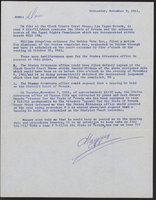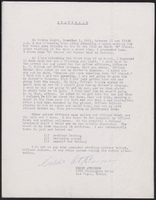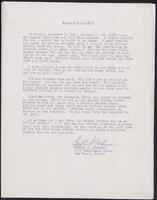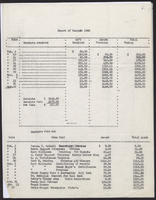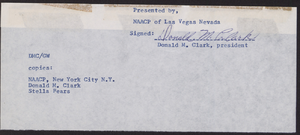Search the Special Collections and Archives Portal
Search Results
James A. "Jimmy" Gay III oral history interview
Identifier
Abstract
Oral history interview with James A. (Jimmy Gay) Gay III conducted by Joyce M. Wright in 1973 for the Ralph Roske Oral History Project on Early Las Vegas. In this interview, Gay recalls details about his education in Arkansas and his training in mortuary science in Chicago, Illinois and discusses the nine-year delay in obtaining his license to practice as a mortician in Nevada because of racial discrimination. He recounts his move to Las Vegas, Nevada in 1946, his experiences as a recreation director and as a personnel and communications director for the hotel industry, work that he took while waiting for his licensure to practice. He also talks about his career as a mortician with Palm Mortuary in Las Vegas, the atomic testing of the 1950s and 1960s, and his long involvement with the NAACP and the Freedom Fund. He closes by reciting two poems that have inspired him and express his philosophy.
Archival Collection
Dr. James B. McMillan oral history interview
Identifier
Abstract
Oral history interview with Dr. James B. McMillan conducted by Perry Kaufman on April 14, 1972 for the UNLV University Libraries Oral History Project. In the interview, McMillan discusses his childhood in Aberdeen, Mississippi and his parents' experience with racial discrimination. He then talks about his own experiences with racial discrimination while living in Las Vegas, Nevada. McMillan recalls his involvement with the National Association for the Advancement of Colored People (NAACP), and the tension between community leaders and local politicians including Pat McCarran and John Russell. McMillan discusses integration and white power structures and how they affect the Black community in Las Vegas. Lastly, he discusses his relationship with other Black activists and figures in the community, including Dr. Charles West, Bob Bailey, Lubertha Johnson, and Mabel Hoggard.
Archival Collection
Sarann Knight Preddy oral history interviews
Identifier
Abstract
Oral history interviews with Sarann Knight Preddy conducted by Claytee D. White on June 05, 1997 and March 11, 1998 for the Women's Research Institute of Nevada (WRIN) Las Vegas Women Oral History Project. Preddy begins her interview by discussing her upbringing in Oklahoma. Preddy then talks about moving to Las Vegas in 1942 and her first job at the Cotton Club. She then discusses moving to Hawthorne, Nevada, buying her club, the Lincoln Bar, and working for the local chapter of the National Association for the Advancement Colored People (NAACP). Preddy also talks about gaining gaming licenses for her establishments and about the migration patterns of the African American community in Nevada. She describes the Westside community, education, and prejudice in Las Vegas, Nevada. Lastly, Preddy describes important places and people in the Las Vegas community.
Archival Collection
Ishman, W. Dean
W. Dean Ishman was born in Bronx, New York and moved to Las Vegas, Nevada in 1995. In 2003, he became the President of the Las Vegas chapter of the National Association for the Advancement of Colored People. As president he reorganized the NAACP and put effort into recruiting more Hispanic people to the organization.
Person
Walker, Eleanor
Eleanor Walker served as President of the Las Vegas, Nevada Chapter of the NAACP in the early 1970s. She has held several jobs throughout her lifetime, including ones at Pan American Airways, AT&T, and Caesars Palace. She was among the first black individuals to hold a position in many of the companies for which she worked, paving the way for future generations. Some of her most noteworthy work was with Operation Independence and the NAACP, as she played a role in many positive changes made for Westside Las Vegas and the African American community.
Person

